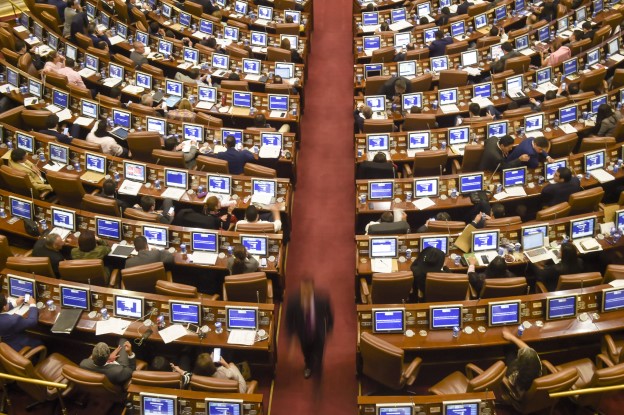BOGOTÁ – Congressional politics were already chaotic before the pandemic. Then came Zoom.
Beginning on May 14, members of Congress will have the option of attending plenary sessions on the video conference platform or in person at the legislature – so long as they follow precautions, including the mandatory use of masks.
Lawmakers have been trying out the platform since March 28, when President Iván Duque issued a decree permitting virtual meetings for Congress and other governing bodies during the COVID-19 emergency. But thus far the process of figuring out how to legislate remotely has frustrated many lawmakers, all while exacerbating existing tensions between the government and the opposition.
For starters, some members of the opposition say the government’s original decree was overly vague, leaving them to spend nearly two months unsure of how and when Congress should be called to meet and whether sessions should be public. And while Congress has permission to legislate from home, some members have been wary of conducting plenary sessions and, more importantly, voting on bills, as they fear they may fall prey to some procedural error that might render their votes null and void in the future. And since the courts are out of session, the judiciary hasn’t been able to weigh in.
On top of the legal questions, some lawmakers have faced logistical challenges to fulfilling their constitutional obligations. Members have complained about issues connecting to the internet, with one congressman with poor internet at home having to tune into sessions from a police station. Some lawmakers have also taken to Twitter to complain that their microphones have been muted, that their chat window has been disabled by the Zoom host, and that leaders are ignoring their right of reply and loosely applying the congressional rulebook.
The confusing virtual landscape for lawmaking has created a tense new space for the bitter battles between the government and opposition forces in Congress
Lawmakers wrote up rules clarifying some of these issues on May 12, allowing members to attend sessions in person if they want. But the confusing virtual landscape for lawmaking has created a tense new space for the bitter battles between the government and opposition forces in Congress, where no political party commands a majority and where the threat of legislative paralysis looms. As the pandemic persists, lawmakers have demanded hearings with government ministers who are critical to the COVID-19 response, putting the executive and legislative branches increasingly at odds. The ministers of health, finance and interior, for example, have spent several hours talking to the legislature in the last month, answering questions about the economic stimulus package and the gradual reopening process.
Some members of the ruling Democratic Center party, meanwhile, have suggested the current pandemic is the right time to propose radical reforms to Congress. One of them suggests shrinking the Senate from its current 108 members to 51, and reducing the members of the lower house to 106 from the current 172. This proposal would also do away with half of the congressional seats that were granted to the former FARC terrorist group as part of the country’s peace deal. That proposal pales in comparison with one presented by Democratic Center congressman César Martínez, who suggested that Congress should be temporarily closed to allow the government to attend to the pandemic. Martínez and other members of Congress have suggested ministers are too busy dealing with the outbreak to have to answer to the legislature – a constitutional duty – irking some members.
Politics Is Not on Mute
The novel coronavirus has given the national government a much-needed political respite from low approval ratings and corruption scandals. However, it would be naïve to believe that the current crisis will make members of Congress abandon their intense rivalries to find common ground with the government. It is also unrealistic for members of the ruling party to attempt to do away with the opposition, even in this crucial time.
Politics as we knew it will resume in Colombia and the issues that were leading the debate before the crisis will make a fierce comeback once the crisis subsides. Although a vast majority of Colombians disapprove of Congress, not having a functioning legislature creates a power vacuum that is unsustainable for a country that prides itself on upholding democratic values.
—
Guzmán is the director of Colombia Risk Analysis, a political risk consulting firm based in Bogotá. Follow him on twitter @SergioGuzmanE and @ColombiaRisk







